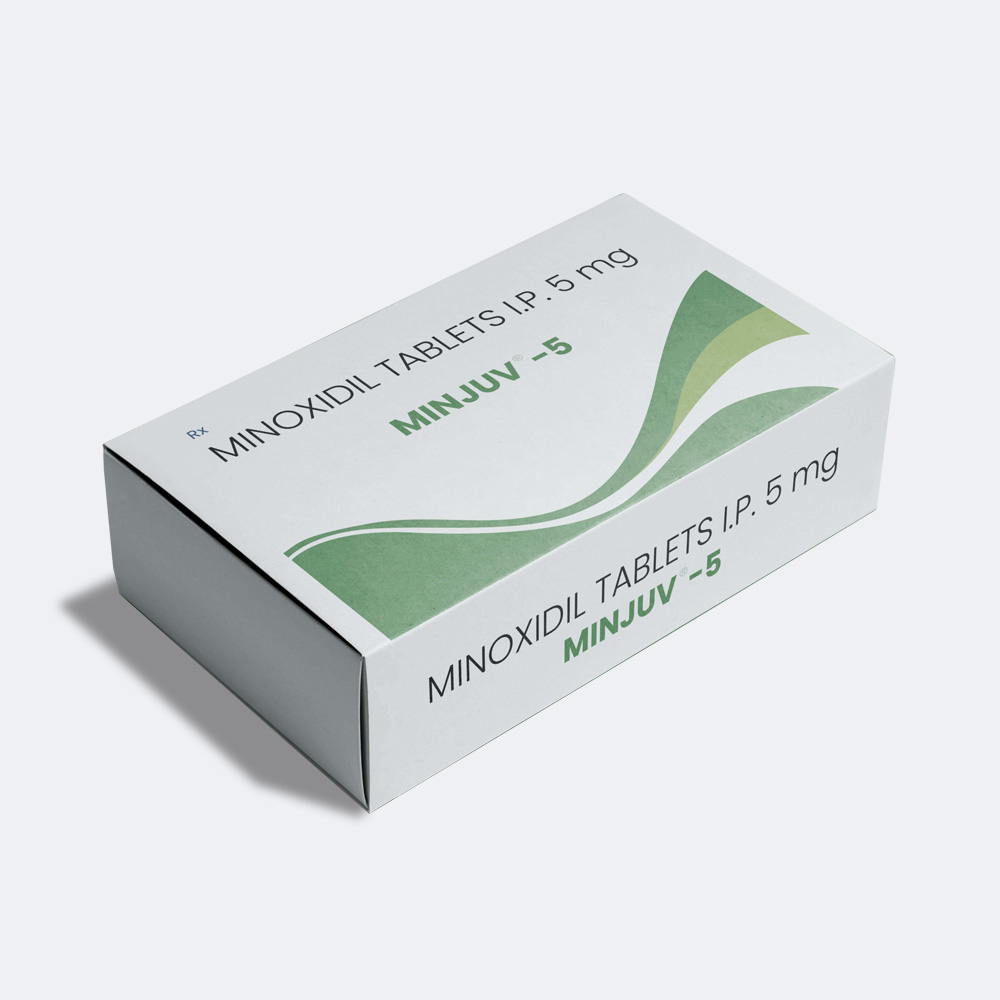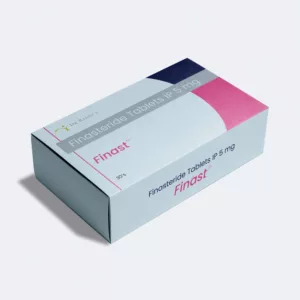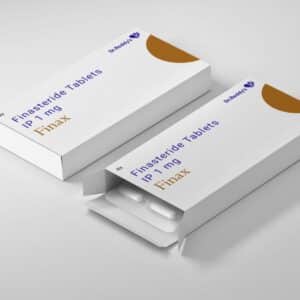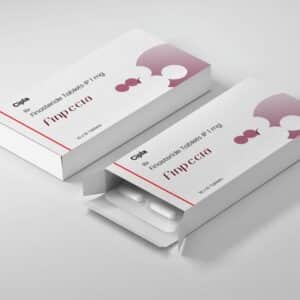What Is Minoxidil 5 mg?
Minoxidil 5 mg is an oral medicine used to treat male and female pattern baldness (androgenetic alopecia). Each tablet contains 5 mg of minoxidil, a vasodilator that helps restore hair growth by improving blood flow to the scalp. The medicine was first created to treat high blood pressure, but later found to promote new hair growth in both men and women. The medicine widens blood vessels, allowing more oxygen and nutrients to reach the hair follicles. Hence strengthens weak follicles, extends the hair growth phase, and increases the thickness of each strand. Oral minoxidil offers an alternative to topical minoxidil solutions. It is prescribed for people who do not respond to topical forms or find them hard to use. The oral tablet delivers consistent absorption and benefits patients with low levels of the enzyme sulfotransferase, which activates topical minoxidil. Minoxidil 5 mg requires a doctor’s prescription and regular monitoring. Most users notice reduced hair loss within three months and visible regrowth within six months of continuous treatment. The medicine remains one of the most effective oral options for long-term hair restoration in both men and women.
What Is Minoxidil 5 mg Used For?
Minoxidil 5 mg is used to treat male and female pattern baldness (androgenetic alopecia). The medicine targets progressive scalp hair thinning caused by hormonal and genetic factors. It helps men and women regrow thicker, stronger hair and prevents further loss when used consistently. In men, Minoxidil 5 mg treats male pattern baldness by stimulating new hair growth. The medicine promotes the regrowth of lost hair, increases hair density, and prevents further shedding. It works by widening blood vessels in the scalp, improving blood flow, and delivering more oxygen and nutrients to the hair follicles. This process extends the active growth phase of each follicle, producing longer and stronger hairs.
A research article titled, Efficacy and Safety of Oral Minoxidil 5 mg Once Daily in the Treatment of Male Patients with Androgenetic Alopecia: An Open-Label and Global Photographic Assessment, confirms the strong efficacy of oral minoxidil in men with pattern hair loss. Research shows that 100% of men treated with oral minoxidil 5 mg showed visible improvement after 24 weeks of treatment, while 43% achieved excellent results with a 71–100% increase in hair density. These outcomes demonstrate the consistent performance of oral minoxidil as a hair regrowth therapy.
In women, Minoxidil 5 mg also supports treatment for female pattern hair loss. While the research is more limited, oral and topical minoxidil both show safety and effectiveness in women. Lower doses between 0.25 mg and 1.25 mg are prescribed for women to stimulate regrowth and slow progressive thinning. This oral form is useful for women who do not respond well to topical treatments. Minoxidil 5 mg is suitable for early to moderate stages of hair loss. It is most effective for male pattern baldness on the crown and frontal areas, and for female hair thinning across the scalp. The medicine helps reverse follicle miniaturization and maintain long-term hair density when used continuously under medical supervision.
How Does Minoxidil 5 mg Work?
Minoxidil 5 mg works by stimulating hair follicles and increasing scalp blood flow. The medicine helps regrow hair and prevent further loss in men and women with pattern baldness. It acts directly on hair follicles to extend their growth phase and revive inactive follicles. The primary action of Minoxidil 5 mg involves potassium channel activation and vasodilation. The medicine opens potassium channels in the smooth muscle cells of blood vessels and hair follicles. This process relaxes the vessels, increases blood flow, and improves the supply of oxygen and nutrients to the scalp. The better circulation nourishes hair roots and supports stronger growth.
Minoxidil also acts through several secondary biological pathways. It activates the Wnt/β-catenin signaling pathway, which supports follicle regeneration. It increases vascular endothelial growth factor (VEGF) expression, promoting new blood vessel formation around follicles. The drug also shortens the resting phase of the hair cycle and triggers early entry into the active growth phase. As a result, hair becomes thicker and denser over time. The therapeutic effects of Minoxidil 5 mg appear gradually. Most people notice initial improvement within 8 to 12 weeks of regular use. Significant results, including visible regrowth and higher hair density, appear after 3 to 6 months. Maximum benefits are usually achieved after 12 to 24 months of consistent daily use.
What Is The Recommended Dosage Of Minoxidil 5 mg?
The recommended dosage of Minoxidil 5 mg depends on gender and medical need. For men with androgenetic alopecia, the standard dose is 5 mg taken orally once daily. For women, lower doses between 0.25 mg and 1.25 mg are preferred to minimize side effects, though 5 mg may be prescribed in select cases under medical supervision. Minoxidil 5 mg tablets should be taken once daily with or without food. The tablet must be swallowed whole with water and should not be crushed or chewed. Taking it at the same time every day helps maintain steady drug levels and improve results.
Visible improvements take time and patience. Hair shedding may temporarily increase during the first few weeks as follicles shift into the active growth phase. Noticeable regrowth generally appears within 3 to 6 months. Continued daily use is essential to maintain results, as stopping the medication allows hair loss to resume gradually. Long-term treatment ensures sustained benefits. Minoxidil 5 mg provides lasting hair growth only while therapy continues. Missing doses or stopping treatment reverses progress. Regular use under a doctor’s supervision helps maintain scalp coverage and overall hair health.
What Are The Side Effects Of Minoxidil 5 mg?
Minoxidil 5 mg is generally well-tolerated, but some users may experience mild to moderate side effects. Understanding these effects helps ensure safe and informed use.
- Hypertrichosis (unwanted facial and body hair growth)
- Pedal edema (swelling of feet and legs)
- Dizziness
- Headache
- Increased heart rate (tachycardia)
- Rapid heartbeat or palpitations
- Chest pain or angina
- Itching or skin rash
- Temporary hair shedding (telogen effluvium)
- Pericardial effusion
- Myocardial infarction
- Severe hypotension
- Stroke or cerebrovascular accident
- Allergic reactions (rash, swelling, itching)
What Are The Drug Interactions Of Minoxidil 5 mg?
Minoxidil 5 mg has few drug interactions, but caution is needed when it is taken with blood pressure-lowering medications. Below is a list of medications that can interact with Minoxidil 5mg.
- ACE inhibitors (lisinopril, enalapril)
- Angiotensin II receptor blockers (losartan, valsartan)
- Beta-blockers (metoprolol, atenolol)
- Calcium-channel blockers (amlodipine, diltiazem)
- Diuretics (furosemide, hydrochlorothiazide)
- Alpha-blockers (doxazosin, prazosin)
- Centrally acting antihypertensives (clonidine, methyldopa)
- Vasodilators (nitroglycerin, sildenafil)
- Psychiatric medications (alprazolam, bupropion, apomorphine)
- Guanethidine
How Should Finast 5 mg Be Stored?
- Store Minoxidil 5 mg at room temperature between 59°F and 86°F (15°C and 30°C).
- Keep minoxidil away from moist or damp environments.
- Do not store this medication in bathrooms, as bathrooms have high humidity levels that can degrade the medication.
- Store your medication away from direct light and high temperatures to prevent degradation.
- Keep tablets in their original blister packaging.
- Keep Minoxidil 5 mg out of reach of children and pets






Reviews
There are no reviews yet.